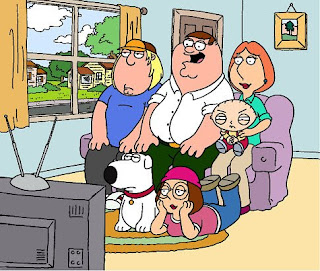 Thanks as always for your Friday questions. Here are some answers:
Thanks as always for your Friday questions. Here are some answers:Mel starts us off:
Just curious what you think of shows like South Park and Family Guy that seem to exist solely to push the envelope of taste.
I like them both but I’m more a fan of FAMILY GUY. I must be honest and say part of my problem with SOUTH PARK is I just don’t like the animation. I know it’s stylized that way on purpose and I know it allows them to bang out shows very quickly and be super topical (which is unheard of in series animation) but after five minutes if I’m not laughing I’m gone.
FAMILY GUY tends to be inconsistent but they have a pretty high batting average. Usually I can count on getting at least two or three big laughs every episode and every so often they’ll have an episode that just hits it out of the park.
I love that FAMILY GUY pushes the envelope. When I have a problem with the show it’s never because they were too audacious. It’s because at times they will belabor a joke to fucking death. I don’t know why they do that but it drives me bonkers. Otherwise, I love the show.
Fitch is…
Curious about tv producers.
How many are also writers? How many are "executive" producers, how they differ, from non-executive producers, for lack of a better term, and how they interact with showrunners.
Most producers are writers. Beyond that the titles don’t mean much. It has more to do with promotions and money. Entry level staff writers tend to get the credit “story editors”. After a season or two they are promoted to “producer” and get a bump in salary.
To be eligible to win an Emmy if your show is named Best Comedy or Drama you need to be a producer. Now however, the size of staffs has grown so ridiculously that the ATAS has put a limit on the number of eligible producers.
But if you have a large staff of say ten writers (not uncommon) you could have ten producer credits. And to distinguish seniority more than anything else these titles can be producer, supervising producer, co-supervising producer, co-executive producer, executive producer. But everybody does the same thing regardless of title. It’s not like the co-supervising producer answers to the co-executive producer.
Then there are the non-writing producers. Since they generally have a “production company” they tend to share executive producer credit with the show runner. Personally, I believe that if you’re not in the writing room until 2 a.m. with the rest of the staff you don’t deserve an executive producer credit. The problem with that is – most of the time you don’t WANT non-writing producers in the room. There’s nothing worse than a non-writer who thinks he’s funny and pitches jokes in the writers room.
The only other producer is the line producer (with the credit “produced by”) and that’s the only REAL producer. That’s the person who hires the crew and supervises post production and the million other details that go into mounting a show.
Dan in Missouri asks:
Why did the Eddie LeBec character get dumped from Cheers? Jay Thomas talks about this often on his radio show. I'd love to hear your version of the story.
I did an entire post about that that you can find here. I encourage you guys to rummage through the archives. Every so often you’ll find a good one.
And finally, Nat G has a Cliff query:
In the early Cheers,
 Cliff was a bore who knew a lot of accurate information. Later, he was a bore who made up a lot of stuff. I've always wondered if this was a conscious change, or whether some later writers just never picked up on the fact that Cliff had known what he was talking about.
Cliff was a bore who knew a lot of accurate information. Later, he was a bore who made up a lot of stuff. I've always wondered if this was a conscious change, or whether some later writers just never picked up on the fact that Cliff had known what he was talking about.Actually, Cliff was always a complete gasbag. Every so often he got facts right but that’s the same principle as if you put a monkey in a room with a typewriter eventually he’ll type a word.
No comments:
Post a Comment